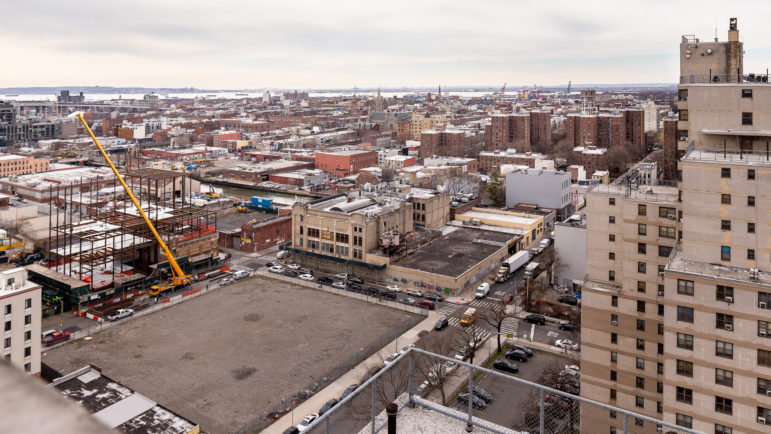Mayor de Blasio issued an executive order this week suspending in-person meeting requirements during the public land use review — a main point of contention for critics of the Gowanus rezoning.

Adi Talwar
A view of Gowanus.The city’s Law Department wants the state Supreme court to dismiss a Gowanus community group’s lawsuit challenging the use of virtual public hearings — with lawyers for the de Blasio administration pointing to an executive order, issued by the mayor this week, that officially authorizes the use of such remote meetings due to the ongoing pandemic.
Community group Voice of Gowanus filed their lawsuit Jan. 15, bringing public review of the city’s rezoning proposal for the Brooklyn neighborhood, which was expected to kick off just days later, to a halt. The group argues that virtual hearings violate the city’s own rules for the Uniform Land Use Review Procedure (ULURP), arguing that online public meetings are not an adequate replacement for in-person events.
But the city is asking the court to toss the case, citing mayoral executive order 188, which Mayor Bill de Blasio issued on March 13 and which “explicitly suspends any in-person hearing requirements that might independently exist under the City’s ULURP Rules,” according to court papers filed Wednesday. The Law Department argues that virtual meetings have resulted in higher attendance numbers compared to those held in person, and that the city compiled with Charter rules to host meetings before the certification of a land use action.
“We’re urging the Court to dismiss this case because there is no legal basis to support these claims. Virtual meetings held during the pandemic make sense, have increased participation among the public in the land use process, and are 100 percent justified under the Mayor’s Executive Order,” said Nick Paolucci, Law Department spokesman, in an emailed statement to City Limits. “This litigation is preventing community voices from being heard and is delaying the creation of jobs, housing, open spaces, and a number of other community amenities.”
Within the first weeks of the pandemic last year, Gov. Andrew Cuomo issued an emergency order temporarily suspending the state’s requirement to provide public in-person access to meetings. It specified that meetings could instead be held remotely “by conference call or similar service” and required the public to have full access to those online sessions. That order is still in effect.
Last March, as the city began shutting down certain services to offset the spread of coronavirus, Mayor de Blasio issued an emergency order to suspend ULURP, but allowed the process to resume again in October by shifting to virtual public meetings via an online portal, NYC Engage. While the city says the online meetings have drawn more attendees than prior in-person events, Voice of Gowanus argues the virtual platform is insufficient and violates the city’s own ULURP regulations.
But in court papers, the city says those claims are bereft due to both the governor’s earlier order suspending open meetings law requirements as well as and the new mayoral executive order 188 issued over the weekend.
Voice of Gowanus attorney Jason Zakai says the group will not be hindered by the city’s new claims, and plans on fighting back in court.
“The Mayor’s latest Executive Order, issued one year into the pandemic and while the Voice of Gowanus Article 78 proceeding against the City has been pending in Court for months, is an obvious and desperate attempt to bypass the judicial process. The Mayor’s action reflects his own awareness that the City’s plans for virtual public hearings are unlawful under New York City law,” Zakai said in a statement emailed to City Limits. “And the sheer absurdity of first attempting to impose new laws for the ULURP process via ‘Emergency’ Executive Order this far into the pandemic should not be lost on anyone. We will respond to the City’s motion as appropriate.”
The de Blasio administration is proposing to rezone 80 blocks of Gowanus, which it says could lead to the creation of 8,200 new apartments by 2035, with an estimated 3,000 of them permanently affordable under the city’s mandatory inclusionary housing (MIH) program. Critics have argued the plan would negatively impact the environment in and around the Gowanus Canal, a known EPA superfund site, and would not create the affordable housing needed for the larger Gowanus community.
The mayor’s executive order could also impact another lawsuit which has challenged the city’s use of virtual hearings. Alicia Boyd and LaShaun Ellis, members of Movement to Protect the People (MTOPP), filed a lawsuit last month which was granted a temporary restraining order against a Crown Height development which could potentially block the view of the Brooklyn Botanical Gardens. This is Boyd’s second lawsuit against the development project. At a protest against a piece of City Council legislation earlier this week, Boyd mentioned the mayoral executive order during her speech, saying she was going to be fighting back harder against the city administration.









